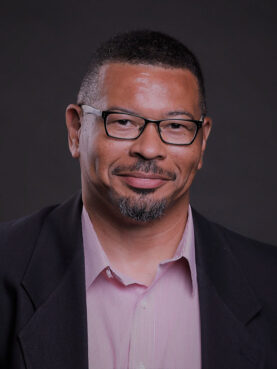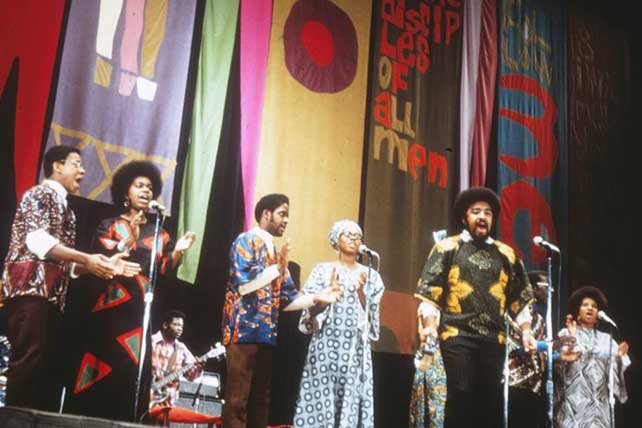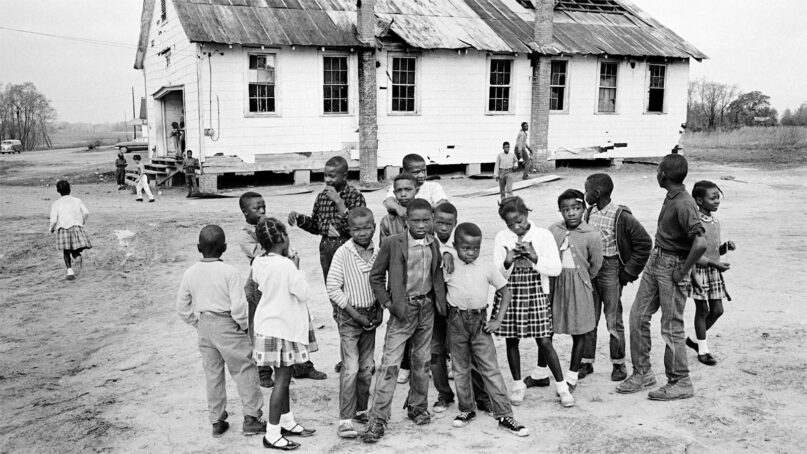A new documentary is shedding light on a group of people who are part of the evangelical Christian tradition in a way, said Wheaton College theology professor Vincent Bacote, “that’s not just white and being a Republican.”
Black evangelicals, said Bacote, are too often unseen — the “orphan in our home faith community.” Over the last decade and a half, he has sought to remedy that by turning the history of Black evangelicals into a 90-minute documentary, “Black + Evangelical.” The film, produced in conjunction with his evangelical college and Christianity Today, premiered at a Feb. 21 screening on the school’s Chicago suburban campus.
Bacote, 59, said he hopes the documentary will answer a question he’s asked frequently since white evangelicals have become a force in American conservative politics. “Did you know that the word evangelical can mean something else than what you think it means if you read most of what’s in the media today?”
RELATED: Wheaton College Clash Over Russell Vought Escalates, Exposing Evangelical Fault Lines
Through two dozen interviews, historic photos and archived recordings, the documentary traces the experiences of Black evangelicals and the challenges of maintaining a dual identity, one often misunderstood by people who share either their religion or their race.
A still from the “Black + Evangelical” documentary. (Courtesy photo)
“A Black evangelical is not a white evangelical in Black face,” declares the Rev. Walter McCray, president of the National Black Evangelical Association, in the film. “There’s something very authentic and deeper. The most prominent Black evangelical in the Bible was Jesus.”

Vincent Bacote. (Courtesy photo)
The documentary notes that there are 900 million evangelicals across the globe and an estimated 90 million in the United States, spanning faith traditions, denominations and races.
Statistics vary about how many of these groups are Black, especially as some members have distanced themselves from the term in recent years. But a Pew Research Center report released Feb. 26 found that 7% of U.S. evangelicals identified themselves as Black, up one percentage point from findings in 2014 and 2007. Public Religion Research Institute found in a 2023 study that 41% of Black Christians identify as evangelical or born again and 59% do not.
The documentary traces the early influence of Black evangelicals to Berlin M. Nottage, who came to the U.S. from the Bahamas with his two brothers in the early part of the 20th century and headed to northern cities to evangelize Black populations that had migrated there from the South.
“I had never been a part of a man’s life and ministry that was so saturated with Scripture as that man,” William “Bill” Pannell, an emeritus professor at Fuller Theological Seminary who died in the fall, said in the film. “And the Scriptures that he was particularly captivated by was that part of the word of God, that Pauline tradition that Nottage used to tell Black people who they really were, that they were really somebody.”
Some Black evangelicals grew up in traditional African American denominations and came into the evangelical movement through parachurch organizations such as The Navigators, Young Life and InterVarsity Christian Fellowship.
Stan Long, an executive vice president of Tom Skinner Associates, the Black-run evangelism and leadership training group, talked in an interview in the documentary about the sense of isolation felt by many Black evangelicals, some of whom met while working as the sole Black employees at predominantly white evangelical organizations.


